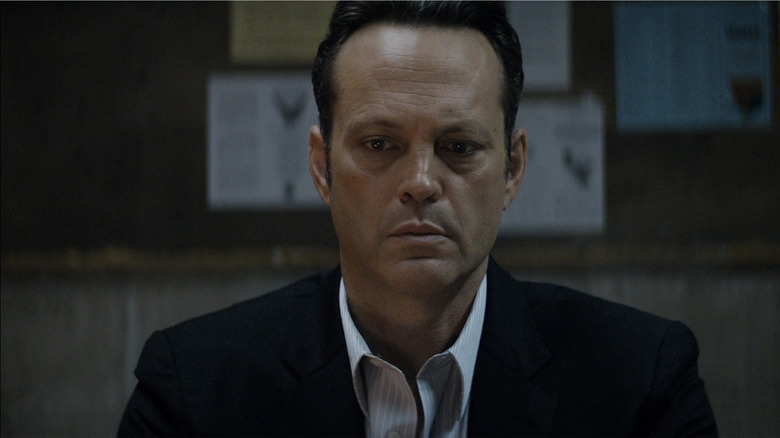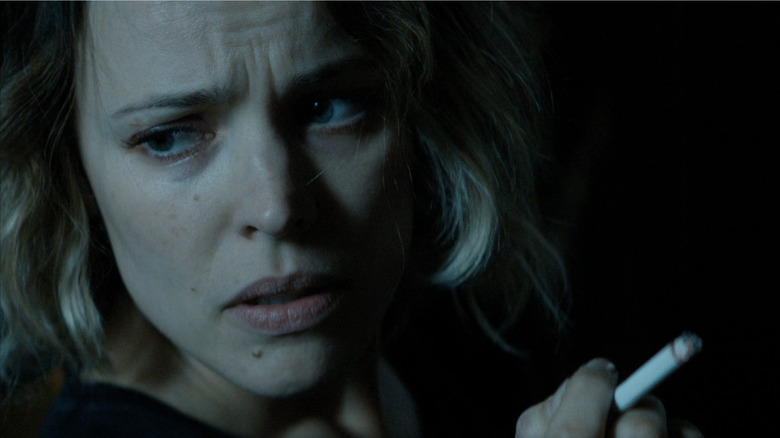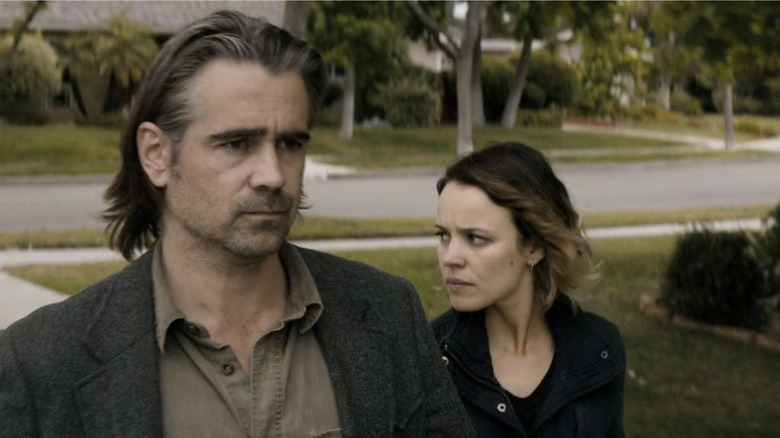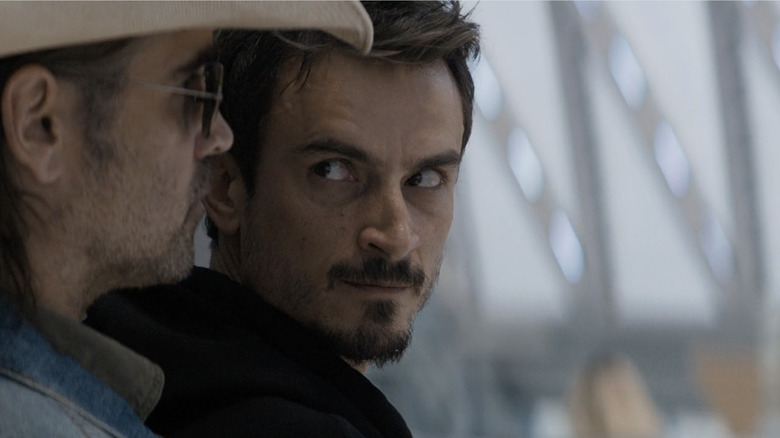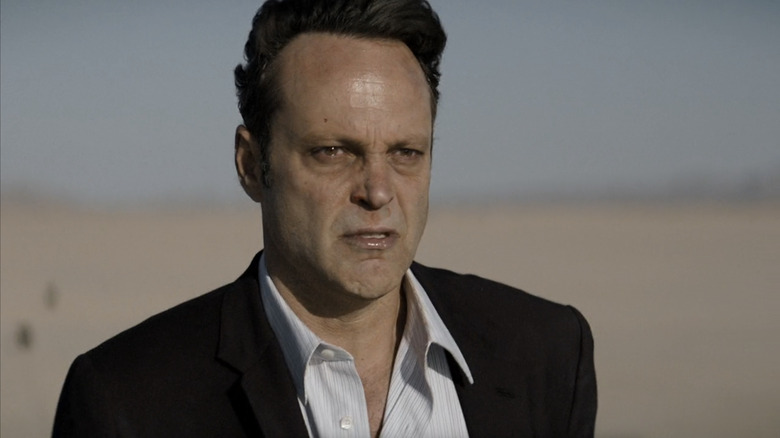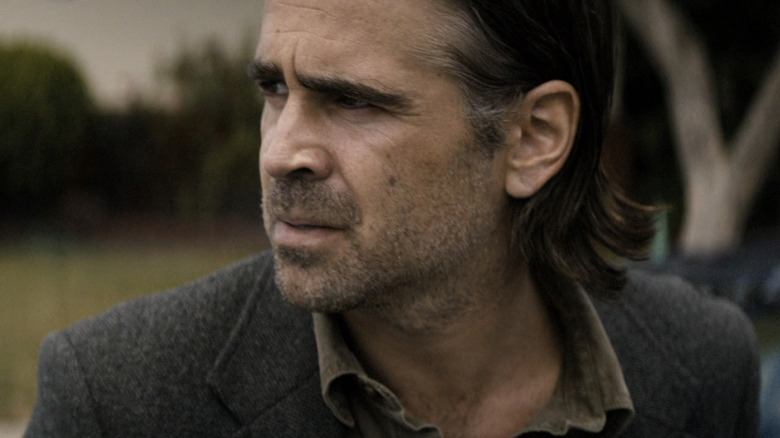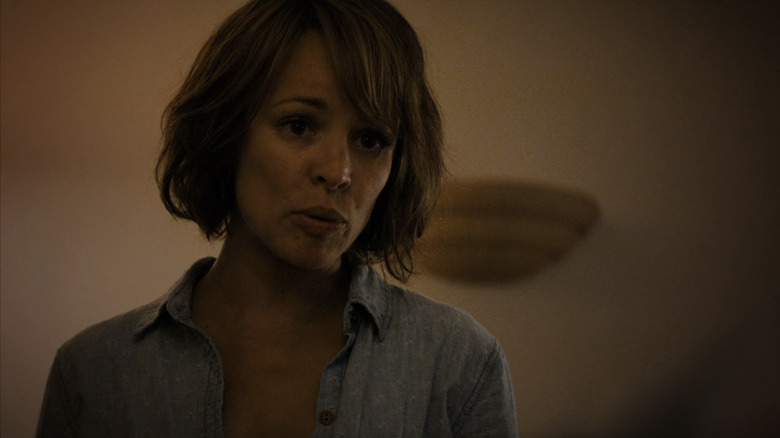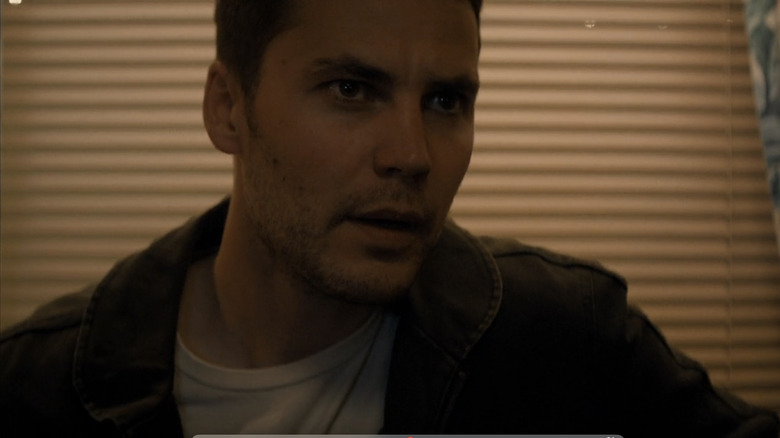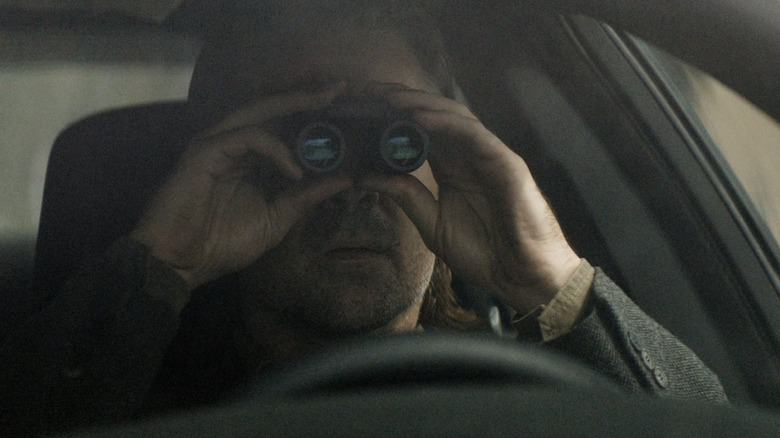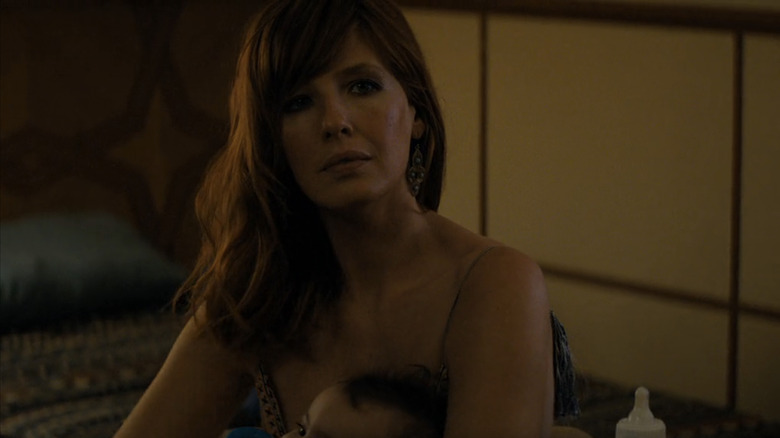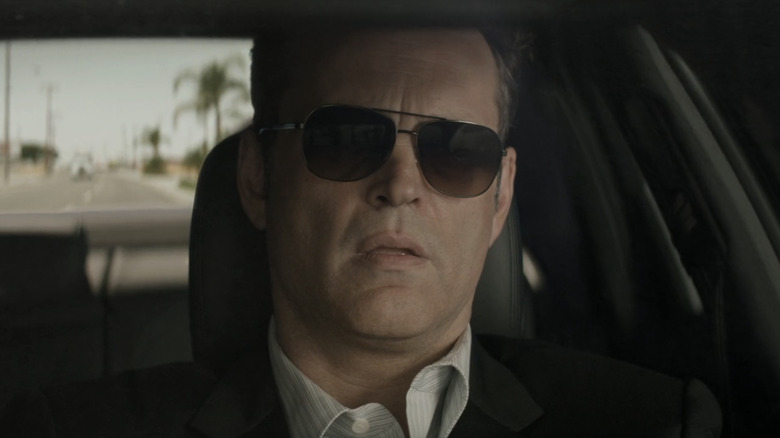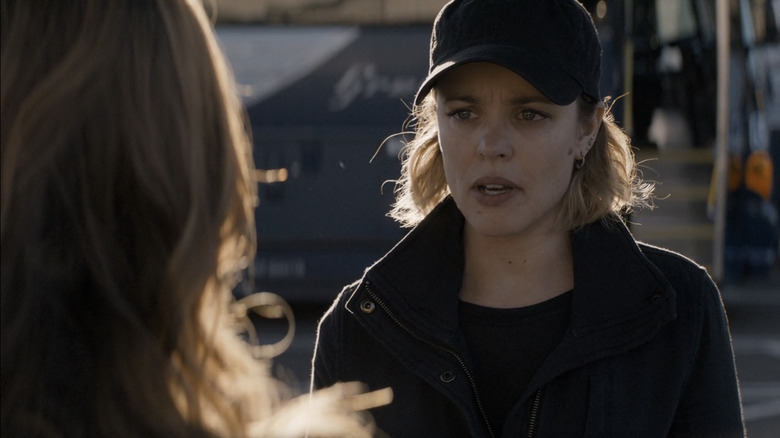The Ending Of True Detective Season 2 Explained
The first season of HBO's "True Detective" was a bona fide hit in 2014. While it didn't start the TV anthology series boom of the 2010s — FX's "American Horror Story" had been in the game for several seasons by then — its influence can be seen in many of the anthologies that followed, from "Castle Rock" to "American Crime Story" and "The White Lotus." With its sweaty Louisiana atmosphere, cosmic horror-infused murder mystery, and a pair of arguably career-best performances from stars Woody Harrelson and Matthew McConaughey, the show was a ratings and awards magnet and made instant celebrities of series director Cary Joji Fukunaga and writer-creator Nic Pizzolatto. Ten years later, the twisty saga of Marty Hart, Rust Cohle, and the Yellow King killer is still fodder for catchphrases, pop culture references, and memes.
Even if "True Detective" had not been an anthology series, expectations for Season 2 would have been unreasonably high. But now, Pizzolatto and company had to not only catch lightning in a bottle all over again, but with a brand new cast, location, and mystery. It was a recipe for disaster under the best of circumstances, made even worse by behind-the-scenes drama like a rushed production schedule and the departure of Fukunaga before filming began. By the time the Season 2 finale aired in August 2015, critics and fans had largely written Season 2 off as a major disappointment. But now, all these years later and with a fresh perspective, let's try to unravel the many threads of "True Detective" Season 2.
What you need to remember about the plot of True Detective Season 2
For Season 2, Pizzolatto and his team of directors (including regular "Fast and Furious" franchise director Justin Lin) relocated from the sultry, overgrown South to the dusty, winding Pacific coast. The plot kicks into gear when California Highway Patrolman Paul Woodrugh (Taylor Kitsch) finds the acid-burned body of Ben Caspere, a high-ranking official in the corrupt fictional city of Vinci, on the side of the road. Caspere's murder puts Woordrugh in a loose partnership with self-hating city cop Ray Velcoro (Colin Farrell) and volatile county detective Ani Bezzerides (Rachel McAdams). Meanwhile, local gangster Frank Semyon (Vince Vaughn), who was in business with Caspere (and has his own sordid history with Ray), seeks answers on his own.
Evidence leads the characters to a small-time pimp and drug dealer (Cesar Garcia), and after a deadly shootout, the case is considered closed. Months later, though, Ray's former commanding officer, Davis (Michael Hyatt), approaches them with new evidence that Caspere's murder was not a smash-and-grab gone wrong, but part of a vast, decades-long conspiracy implicating the city's mayor, police chief, Russian mobsters, and a shadowy conglomerate buying up land parcels in advance of an upcoming high-speed rail project. While the detectives close in on the truth of the case, Frank fights for his life and his livelihood as Vinci's criminal underworld closes in on his casino business.
What happens at the end of True Detective Season 2
Ray, Ani, and Paul infiltrate a sex party attended by Vinci's elite, including Mayor Chessani (Ritchie Coster) and Chief Holloway (Afemo Omilami), during which Ani is dosed with LSD and kills a bodyguard in self-defense. The trio hole up in a roadside motel, armed with evidence of the conspiracy surrounding Caspere's death, but Paul slips out. Unbeknownst to them, he is being blackmailed by Holloway with pictures of a recent tryst with former friend Miguel (Gabriel Luna). At a clandestine meeting with Holloway, he is gunned down. Back at the motel, Ray and Ani give in to their mutual attraction and sleep together.
After Paul's death, the dominos begin to fall. Chessani is murdered, and Holloway is shot to death by his own security team in a confrontation with Caspere's killer. Frank outfoxes his enemies by burning down his own casinos and plans to escape to Venezuela with his wife, Jordan (Kelly Reilly). Ray and Ani are set to join them, but when Ray realizes he is being followed by Holloway's hired goons, he leads them into the forest and dies in a hail of gunfire. Frank is waylaid by Mexican cartel members, and he dies bleeding in the desert. About a year later, Jordan, Ani, and the infant son born from her one night with Ray are still in international exile. They share their evidence with a journalist (Mustafa Knight) in the hopes that he will expose the corruption in Vinci and bring a measure of justice to the dead.
Who was the killer after all?
The murder of Ben Caspere exposes the rotten heart of Vinci, California — a cesspool of "naked larceny, open murder, and cascading betrayals," as Ani puts it — so much so that finding his actual killer ends up something of an afterthought for both our detectives and the show itself. Viewers could be forgiven for missing the revelation entirely amidst the action of the finale, as it ends up being only tangentially related to the drama that occupies most of the season.
The seeds of Caspere's doom are planted in 1992, when he and Holloway carried out a fatal jewelry store robbery that left behind two young children, Laura and Lenny. The siblings are separated by the foster system but reconnect decades later to find the men responsible for their broken lives. Laura (Courtney Halverson) gets a job in Caspere's office under an assumed name, and they kidnap him in the hopes of learning who else was involved in their parents' death. However, Lenny (Luke Edwards) lets his anger get the best of him, and he kills Caspere during the interrogation. After learning all this, Ray and Ani intercept Lenny as he waits to ambush Holloway. Ray insists that instead of killing Holloway, the best way to get revenge is "to drag this s*** into the light," but when Holloway reveals that Laura is likely Caspere's illegitimate daughter, Lenny flies into a rage and attacks the police chief. Both men are shot to death by Holloway's private security team.
What happens to Frank at the end of Season 2?
After turning the tables on his Russian competitors by destroying his two casinos and raiding (with Ray) a massive cash drop to fund his escape to Venezuela, it seems like Frank and his wife, Jordan, will make it out of this mess. But on his way to meet her, Frank is cornered by the Mexican cartel members whom he had promised to let do business in his casinos. The cartel is understandably angry that Frank literally torched their deal. They drive him out to a flat, dry stretch of desert, stab him in the gut, and leave him for dead.
Season 1 of "True Detective" heavily referenced the works of turn-of-the-century authors Robert W. Chambers and Ambrose Bierce, particularly Chambers' 1895 novel "The King in Yellow" and Bierce's 1886 short story "An Inhabitant of Carcosa." In Frank's final moments, the show once again tips its hat to Bierce, in an homage to his classic mind-bending tale "An Occurrence at Owl Creek Bridge." Frank, mortally wounded, trudges through the desert and sees visions of men from his past: his hateful father, the neighborhood bullies who called him names, and the associate who double-crossed him in the previous episode. Finally, he sees Jordan, who assures him that he is safe and that he can rest now. He turns to look back at where he started, and like the doomed Confederate saboteur of Bierce's tale, realizes that his body had collapsed at nearly the start of his trek.
How much worse does Ray's story get in True Detective Season 2?
Just a about everyone on "True Detective" is haunted and miserable, betrayed by life, but Ray Velcoro gets it worse than anyone. By the final episode, it feels like the show is taking sadistic glee in giving him a glimmer of hope or happiness and then dumping on him even more. That glimmer comes at the start of the finale, as he and Ani lie in bed together, post-coital — and even then, their pillow talk is about as grim as you could imagine, as she talks about being abducted and sexually abused for four days as a child and he counters with the story of how he killed his wife's rapist.
It doesn't take a professor of dramatic writing to guess that Ray's plan to run away with Ani is nothing more than a pipe dream and that he, like Frank, will end the episode in the ground. But even so, the show is almost comically cruel toward the character. It isn't enough to give him a final, poignant moment from afar with his son, Chad (Trevor Larcom); he has to record a farewell voice memo that never gets sent. It's not enough that Ray spent the entire season agonizing over the possibility that Chad is not his biological son; his ex-wife (Abigail Spencer) gets the result of a DNA test proving Ray is the father after his death. And above it all, in death he somehow takes the fall for the Caspere conspiracy murders.
What does the ending of True Detective Season 2 mean for the show's female characters?
As critically acclaimed as Season 1 was, it was not immune to criticisms. The show's treatment of its female characters raised some gripes among critics. Critic Emily Nussbaum, writing for The New Yorker, took aim at Nic Pizzolatto and Cary Fukunaga for the series' "paper-thin" women, diagnosing them as "wives and sluts and daughters — none with any interior life." Pizzolato took vocal issue with Nussbaum's assessment, most notably in a 2014 Hollywood Reporter interview in which he defended himself by name-dropping "Thelma & Louise" writer Callie Khouri as someone he consulted who vouched for him. But whether or not he agreed with Nussbaum and other critics' view of his female characters, he seemed to have taken some of that criticism to heart in Season 2.
This is still a world where women are largely subject to violence and exploitation by men, whether that's the Eastern European escorts being trafficked into Vinci or Ani's four-day abduction as a child. But the female characters of Season 2 are just as much survivors as they are victims, if not more so. For every man who dies at the end of the season — Paul, Ray, Frank, Lenny — there is a woman (or women) left behind, to grieve or to carry on or to hop a bus out of town. Ani and Jordan ending the season as mothers raising Ray's son together may betray a conservative streak in Pizzolatto's writing, but it is more grace than most of his characters get, or deserve.
What does Paul's death mean?
Every season of "True Detective" is, to one extent or another, about storytelling, and often the stories we tell about ourselves. Each of Season 2's main characters live in a darkness of their own making, unable to see beyond the narratives they have crafted around their traumas. Ray's life was warped by his ex-wife's sexual assault, his killing of the alleged rapist, and the shame that Chad might not be his son. Ani can't shake the idea that her abduction was somehow her fault, that she invited and was flattered by her attacker's attention. Frank dreams of a legitimate business, even as he fears that he is a criminal at heart.
No one's sense of self is quite so damaging, however, as Paul's. His constant denial of his sexual identity not only fractures his relationship with fianceé Emily (Adria Arjona), but it leaves him susceptible to blackmail and intimidation — which is exactly what happens when he reconnects with Miguel. Unbeknownst to Paul, Miguel is a honey trap, and the pictures of their tryst are disturbing enough to make him leave Ray and Ani, even as he knows that he's likely walking into a trap. While it's true that Paul's world is very masculine and homophobic — the f-slur is thrown around more than once — his fate is sealed because he is unable to be honest with himself. Miguel even tells him so at the meeting with Holloway at the end of Episode 7, shortly before he is gunned down.
Unanswered questions from Season 2
The season finale tries to cram as many answers as possible into its runtime, but even so, the previous seven episodes had laid out so many threads that it would be near impossible to tie them all up. There are a few dead bodies lying around whose killers are never fully identified; Holloway's private hit squad likely killed Ray's former commander, Davis, in an effort to frame him, but we never get explicit confirmation that that's the case. Beyond that, there are a few people whom the show loads into a car or a bus, never to be seen again, like Laura, or Ani's hippie father (David Morse) and sex worker sister (Leven Rambin).
Then there is the bird mask. At the end of Episode 2, a man in a large black bird mask shoots Ray point blank with a shotgun filled with rubber bullets, the kind used by law enforcement for crowd control (though the impact at that range probably should have killed him). By the end of the season, we know that Lenny is the man who was wearing the mask and that the mask itself belonged to Caspere. We might assume that the bird mask was intended for use at the kind of sex parties seen in Episode 6, but no actual explanation is given. Looking over the season as a whole, it feels like the bird mask was intended to lure in fans of the first season's cosmic horror vibes, promising a version of the show that was never delivered.
What did critics think of the ending?
According to a 2015 postmortem on IndieWire, Nic Pizzolatto and HBO encouraged critics to watch the finale before issuing summations on the season as a whole, the rationale being that you wouldn't judge a novel by the first few chapters alone. By all accounts, though, that strategy backfired. "Far from redeeming the season," critic Sam Adams wrote, "[season finale] 'Omega Station' drove it into a ditch." Over at the entertainment site formerly known as HitFix (now Uproxx), Alan Sepinwall singled out Rachel McAdams and Colin Farrell's performances as worthy of praise. "And here's what I didn't find good in the finale," he countered, "everything else." Slate's Willa Paskin threw up her hands halfway through the season, then wrote an exhaustive (and exhausted) explainer for the finale.
Not every critic had their knives out for the last episode. Kenny Herzog of Vulture liked it well enough, and The A.V. Club critic Emily L. Stephens was mostly positive, writing that while the season isn't perfect, "it packs a potency that will linger." And to be fair, plenty of critics were disappointed in the finale of Season 1 as well. But that didn't stop Season 1 as a whole from winning a mess of Emmys and appearing on many publications' best-of lists at the end of the year. Season 2, meanwhile, was nominated for just one Emmy (for sound mixing) and showed up on a number of worst-of lists at the end of the year, including the New York Post, Variety, and TV Guide.
What have the cast and crew said about the ending?
So what happened? Going from an era-defining hit to one of the worst shows on the air from one season to the next is a precipitous drop. Part of that is a kind of self-fulfilling prophecy; if you Google the show's name, the first suggested search is "Why is True Detective Season 2 so bad?" which doesn't lend itself to an even-handed consideration of the season's merits. Season 2 had its defenders when it aired in 2015 and has its defenders now, but almost no one would try to claim that it had the same magic as Season 1.
In an interview with HBO (via CBS) after the finale, Pizzolatto insisted that the finale had some of his "favorite stuff from either season" up to that point and that he'd had the ending in place from the very beginning of the writing process. "The ending was in mind as I wrote the first two episodes, and I don't think its final beats changed much, although I questioned them constantly," the showrunner said. HBO programming president Michael Lombardo praised the finale at the time, calling it "as satisfying as any series we've done" (via IndieWire), but a year later took the blame for the season's shortcomings, saying that he pushed Pizzolatto too hard to follow up the massive success of Season 1 as quickly as possible.
What the ending meant for the True Detective franchise
A few months after the end of Season 2, Nic Pizzolatto signed a new deal with HBO, though it would be almost two years before "True Detective" Season 3 was officially announced, and almost another two years after that before it aired. Season 3 in 2019 was a return to form of sorts from Season 2, reviving the multiple-timeline structure, detective pairing set-up, and rural setting of Season 1. It even directly references the events of that first season, establishing a shared universe that became even more connected with Season 4, subtitled "Night Country," in 2024. The long-awaited fourth season was the first produced without Pizzolatto's involvement, but even so, writer Issa Lopez looked to Season 1 for guidance, establishing that "True Detective" is a series about certain things: cops in cars, spirals, the Cohle family, the phrase "time is a flat circle."
So where does that leave Season 2? So far, nowhere. "Night Country" shares Season 2's occupation with using the paper trail to uncover shady business deals. And the tunnel system that undergirds Vinci, California, has an echo in the ice cave system that holds so many secrets in Ennis, Alaska. But otherwise, the tale of Ray, Frank, Paul, and Ani is a dead end in the "True Detective" universe — at least for now. In February 2024 HBO announced that the show was renewed for a fifth season, with Lopez returning as writer and showrunner. Will this new season provide some measure of redemption for the much-maligned Season 2? Only a flat circle will tell.
